In the first chapter of the book, In the Land of the Dragons, Mitali tells us about her two boys and their fascination with pets, strange and unusual ones too. An exclusive for Different Truths.

Flowers were blooming, birds were chirping, and spring was hauling itself over the backs of the bleak winter months.
Surya, Jonas, and Henry were hacking rocks in the back garden with hammers. Not that they had been asked to, but they felt the need to. These were three young men from three parts of the world: India-Singapore, Finland, and England, who were unified by their common need to explore a typical Chinese garden. This could happen only in the backyard of an ex-pat household in China, as like the adults, the children also interact with friends from many cultures and countries. We all got bunched together into one group by our distinct differences from the locals. Our Suzhounese landlord had had the garden landscaped by a professional company before renting the house to us. They made rock structures in the garden, which was not really an enticement for me to rent the property. When we lived in the house, Surya, my younger son, and his friends ‘studied’ these features in the garden till parental consternation interfered with their activities. We, parents and their friends, used the garden for more mundane things — like barbecues, sunbathing, and relaxing. Surya and his hordes used it to live through their sense of adventure and wonder at the opportunities provided by Chinese landscapers, who landscaped keeping adults, or rather emperors, in mind.
China’s one-child policy had made the child not only precious but overprotected. So instead of leaving children to play in the garden, an affluent Chinese family would give a child an entourage of maids, grandparents, and other adults, who constantly watched over the youngster. There was no need to provide a safe play area for a lone child. A group of unattended children like Surya, Jonas, and Henry would be unthinkable in the Chinese context.
China’s one-child policy1 had made the child not only precious but overprotected2. So instead of leaving children to play in the garden, an affluent Chinese family would give a child an entourage of maids, grandparents, and other adults, who constantly watched over the youngster. There was no need to provide a safe play area for a lone child. A group of unattended children like Surya, Jonas, and Henry would be unthinkable in the Chinese context. These boys were a group of merry seven-year-olds who had many adventures rediscovering the world on their own.
Then there was a fish pond which we tried to contract to a professional company for maintenance. They came. They saw. They drained. They put the two surviving fish in a bucket and promised to come with fresh fish and reinstate the old ones in the pond after two days. The fish disappeared the next day from the bucket. We were left guessing that the birds made a good breakfast of the two-inch redfish. In China, concepts of time are fluid. Less-schooled adults who run such businesses have the same understanding of time as kindergarteners who mix up different days, weeks and months. After more than three weeks, we gave up all hope of the fish company coming back to complete the job they had promised to do in two days. We had a dry fish pond, which the boys used as a dry ditch for some time.
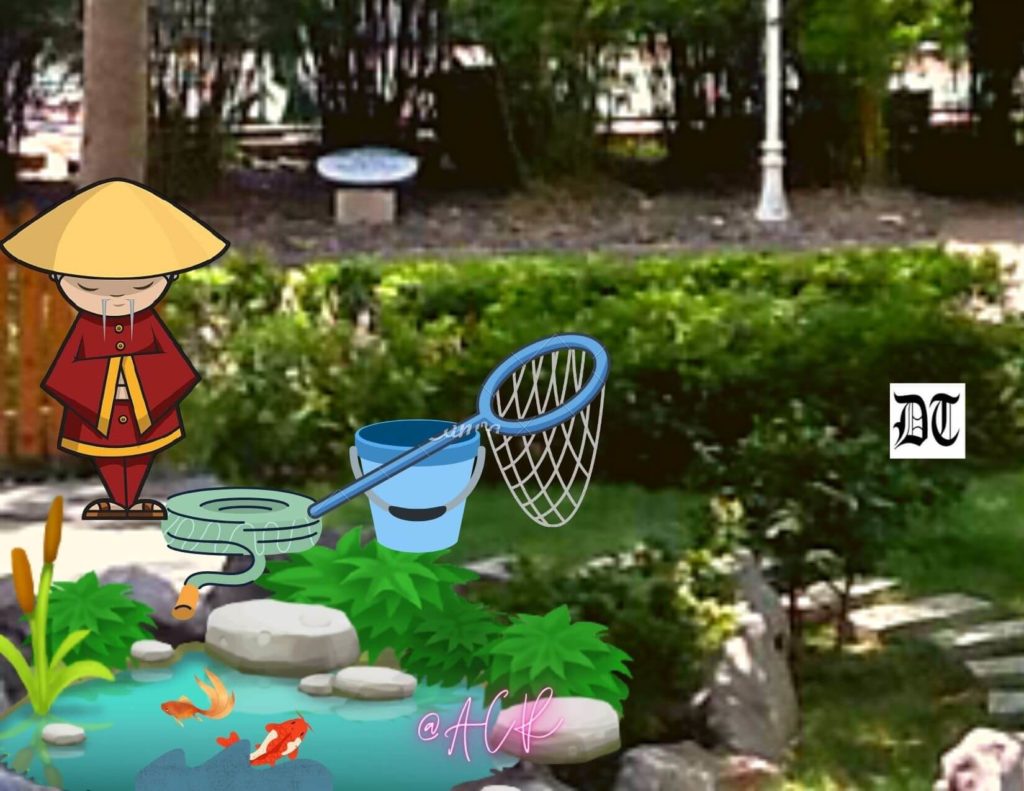
During tadpole season, despite Surya’s pleas, the pond was not opened to frogs and their families. He had to maintain his tadpoles in a high-rimmed plastic plate, which we placed on a concrete table in the garden. The table was put there for people to sit around while gazing at the fish pond, sipping endless cups of green tea from tiny handle-less Chinese teacups, and meditating on profound things.
Surya wanted to breed tadpoles and frogs in it. My sons started out as city dwellers from Singapore, and they ended up fascinated with what a Chinese garden in Suzhou, labelled as the Venice of the East3, had to offer – frogs or mushrooms, snails or fish ponds. During tadpole season, despite Surya’s pleas, the pond was not opened to frogs and their families. He had to maintain his tadpoles in a high-rimmed plastic plate, which we placed on a concrete table in the garden. The table was put there for people to sit around while gazing at the fish pond, sipping endless cups of green tea from tiny handle-less Chinese teacups, and meditating on profound things. However, we let the tadpoles swim in the ‘platarium’ on the tea table, and then Surya saw them hop away as frogs. Some were left when we went on home leave to Singapore. So Surya, who had learnt to speak Chinese fluently, like his elder brother, Aditya, asked the old man who watered our garden to fill up the ‘platarium’ daily. He was a bit disappointed when we returned from our three-week holiday to find that the ‘planetarium’ had disappeared. We told him the tadpoles grew up and hopped into the garden. Therefore, the old man disposed of the plate. We drew no straight answers from the old man, who was much like a kindergartener when it came to accountability.
Then there was a major typhoon. The pond drain got clogged with leaves, and the empty pond filled up with rainwater. It was after this incident that we decided to try keeping fish in the pond by ourselves. In two days, it rained enough for two months, the weather report said. I had never experienced such weather in my life! My boys went out in the rain to check the garden, and Surya was dancing with delight, saying, “The frogs have come back to me. They really like me.” There were a number of small frogs in the overflowing pond, and Surya was convinced they were the ones that had grown up in his ‘planetarium’.
One-year Surya had the distinction of catching tadpoles with his bare hands, along with some frog eggs, which he professed hatched into more tadpoles! In fact, he had become the best tadpole catcher in the neighbourhood. A security guard from our compound trained him.
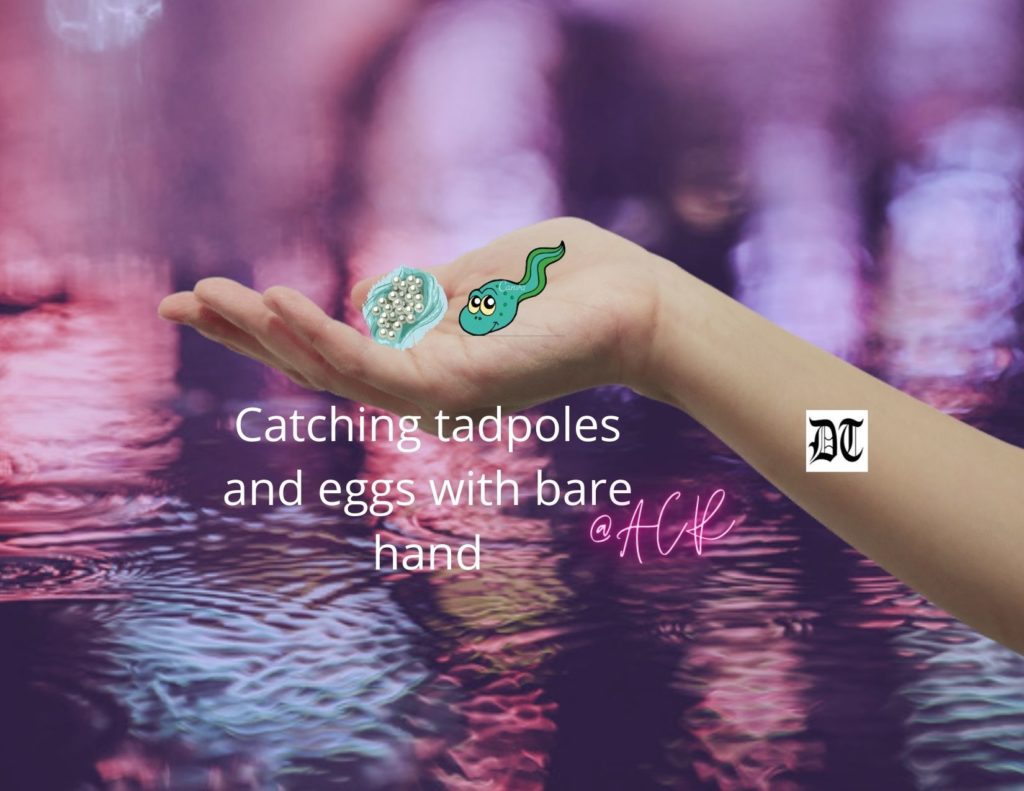
One-year Surya had the distinction of catching tadpoles with his bare hands, along with some frog eggs, which he professed hatched into more tadpoles! In fact, he had become the best tadpole catcher in the neighbourhood. A security guard from our compound trained him. The security guards enjoyed boyish preoccupations, including training young men to become expert tadpole catchers, and sometimes I had seen them even teasing or playing with the young boys. In Singapore, the security guards in our compound hardly interact with children, and frogs near the fountains, swimming pool, or play area would probably draw wails of protests from mothers. That spring, Surya gave the tadpoles his own concoctions of plants mixed with dirty water, and they seem to be doing well. The ones that were the size of five-mao coins looked menacing to me. Jonas saved the tadpoles from the wicked cat by covering their jar with a basket.
And then, Surya had this little frog that lived in the fishpond. So, in a way, he did have a pet frog. I would not want it any closer than the pond!
The summer Aditya was thirteen and Surya was five, I was actually cooking for tadpoles.
Aditya’s romance with frogs started in kindergarten in Singapore, when his classmate got a frog pet for show-and-tell from the “wild grassland behind his home”. They were five-years-old.
And Aditya fell in love with frogs. He, of course, as befitted all macho men of his age, did not like the story of ‘Frog Prince’. For that matter, he confided in me he did not even like the story of ‘Beauty and the Beast’, as the monster turned into a handsome prince. He did not like princesses either.
And Aditya fell in love with frogs. He, of course, as befitted all macho men of his age, did not like the story of ‘Frog Prince’. For that matter, he confided in me he did not even like the story of ‘Beauty and the Beast’, as the monster turned into a handsome prince. He did not like princesses either.
I didn’t like the idea of a frog pet, as I thought of the slimy creature hopping all over and maybe even sitting in my favourite seat and croaking on my bed … or worse, maybe, dancing in my coffee mug or wanting to share the dinner on my plate with me. Then I would need to clean its droppings, as I had to for the indoor fish. In the days of yore, I had to go through the torture of cleaning the stinky fish-tank water. Then the task was taken over by my husband and Aditya as a form of relaxation, though how anybody could relax handling stinky, dirty fish-poo water is beyond my understanding! Once we filled up the pond and bought colourful koi fishes, Aditya took charge of feeding the fish and measuring the right amount of chemical to dechlorinate tap water that was used to fill the pond after cleaning. The children would look on when the cleaning crew of our pond, which was basically the old man who watered the garden, scrubbed it clean.
Surya missed his tadpoles so much after returning from our home leave in Singapore that he picked up fish that look a bit like tadpoles for our indoor fish tank. We found one of the pair dead after a day. Aditya researched on the Net and found we had bought some variety of miniature freshwater pufferfish. These are extremely hard to care for, and they do not like fish food in jars. They need to be fed worms and snails!
Surya missed his tadpoles so much after returning from our home leave in Singapore that he picked up fish that look a bit like tadpoles for our indoor fish tank. We found one of the pair dead after a day. Aditya researched on the Net and found we had bought some variety of miniature freshwater pufferfish. These are extremely hard to care for, and they do not like fish food in jars. They need to be fed worms and snails! Well, I bought a jar of cat food with shrimp, as I could not find jars of worms or snails in the fish-food area of the supermarket. So, the second fish was separated. Aditya put salt in its tank because he read they need saltwater to live. A worm from our garden and a shrimp from the can lay untouched in its separate home. Maybe cat food was not the puffer fish’s cup of tea. After a couple of days, the second fish died too. And these rare fish were being sold as freshwater fish in a jar in the local pet and flower market. The shopkeeper told us they survived in plain tap water!
One of Aditya’s classmates had bought a pet tarantula from the same pet market. You could find vendors of such stuff sitting with cages and bowls of strange pets, including a variety of weird bugs and venomous snakes, on the sidewalks of the flower and pet market. I have never seen such a strange assortment of pets anywhere else in the world.
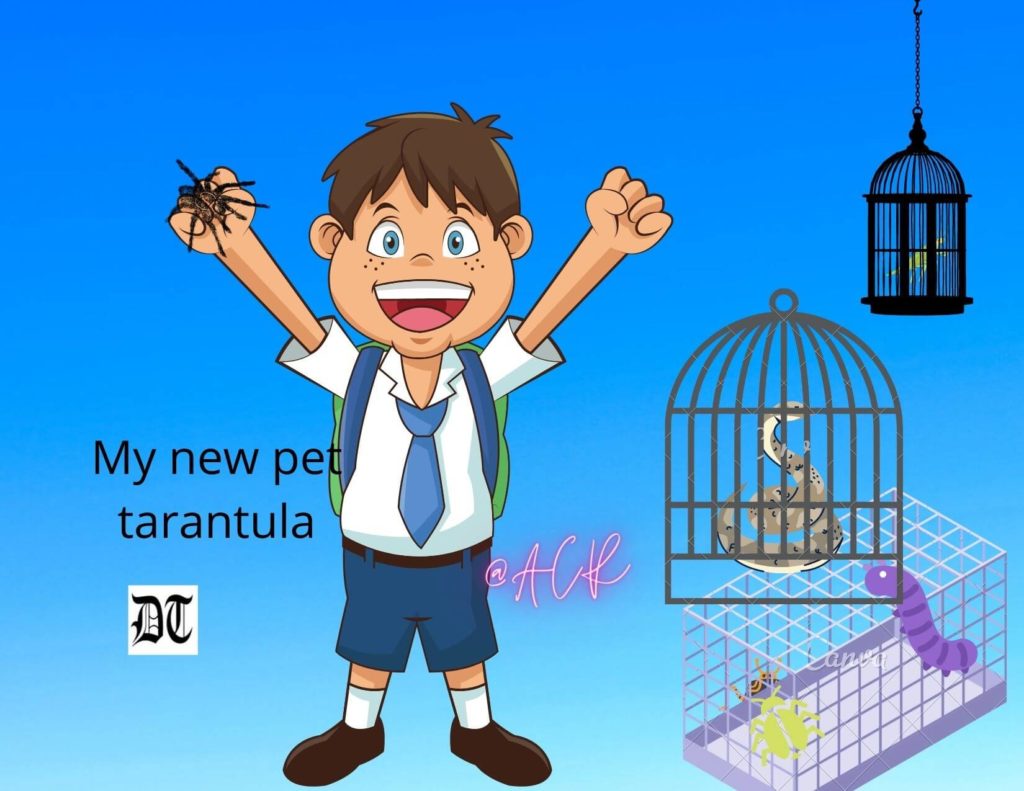
One of Aditya’s classmates had bought a pet tarantula from the same pet market. You could find vendors of such stuff sitting with cages and bowls of strange pets, including a variety of weird bugs and venomous snakes, on the sidewalks of the flower and pet market. I have never seen such a strange assortment of pets anywhere else in the world. We all got to hear of the tarantula when the family moved back to their home country and the boy was looking for a home for his pet. My doors were closed to a pet tarantula, as were most other moms’ doors. I do not know what happened to it in the end.
Surya had also requested for a wall-climbing common lizard as a pet. He had an antarium at a point. There were five huge, black ants in a plastic case filled with blue gel. The blue gel was agar, I think. This was a Christmas present from one of his friends. We fed them icing sugar every day through a tiny hole.
I have fed them all – boys, ants, tadpoles, fish, men, women, girls and more. When I spotted a mouse or rat in my kitchen, an occurrence which I had never faced in my Singapore flat, Surya wanted that as a pet too! Everybody except me was entertained by the rodent in our home. I saw it and heard it, and then it disappeared.
I have fed them all – boys, ants, tadpoles, fish, men, women, girls and more. When I spotted a mouse or rat in my kitchen, an occurrence which I had never faced in my Singapore flat, Surya wanted that as a pet too! Everybody except me was entertained by the rodent in our home. I saw it and heard it, and then it disappeared. It was near my kitchen trash can and making bizarre clicking sounds. I googled it later. It seems they make that sound when they are happy or they eat. Maybe this one was happily eating some kitchen trash! Now I have fed a rat or mouse too … though unintentionally.
Anyway, I was terrified when I glimpsed the rat. I shouted for my ayi ( literally aunty, technically, housekeeper) in absolute distress and said in Chinese that there was a lao hu (tiger) in the house. I was horrified that I had mixed up the words lao shu (rats) with lao hu. Instead of understanding my terror, my help and my family of three could not stop laughing. One good thing about China was that your ayi has no sense of class barriers and is therefore friendly by nature. Of course, the disadvantage is that you need to make sure she does all the work without hurting her. If you upset a worker or an ayi, chances are they will just stop coming without pre-informing you, and your work will remain undone, even if they go unpaid.
I was finally driven in desperation to inform my house agent. He promptly bought me rat traps. As I found the young gentleman coughing and recovering from a cold, and it was two degrees outside, I asked my driver to take him to the shops to buy the mousetraps. Our driver, a twenty-seven-year-old Chinese who could speak English, would not stop smiling. He kept asking for details of the mouse and grinning. Finally, I told him, “Do not look so happy. I am terrified of mice and rats.”
My rat saga never found a conclusion through the rest of our stay in China. The rat did not seem to come near the trap or our home. Meanwhile, one of our neighbours had been battling a rat for many days. After her kids went to sleep, the rodent came to visit them in their parlour. It scampered across the carpet and sat next to my neighbour on the sofa. When I told my house agent our stories, he said he would also organize pest control experts for our home and the neighbourhood.
My rat saga never found a conclusion through the rest of our stay in China. The rat did not seem to come near the trap or our home. Meanwhile, one of our neighbours had been battling a rat for many days. After her kids went to sleep, the rodent came to visit them in their parlour. It scampered across the carpet and sat next to my neighbour on the sofa. When I told my house agent our stories, he said he would also organize pest control experts for our home and the neighbourhood. I looked forward to the day when my home and neighbourhood would be free of all rodents again. The rodent elimination experts seemed to be mythical. They did not put in an appearance for the next two years that we were in China. Again, I reminded myself, I did not have access to an edition of yellow pages in China, and agents could do so much and no more, as they had to deal with the same army of workers who were much like children needing to be alternately reprimanded and petted.
Moving from rodents to reptiles … when Surya was about one, Aditya had a pet turtle. When we put it on the table, it ran! We had to chase it, capture it, and put it back in its tank.
When we came for our look-see trip from Singapore to Suzhou, the turtle developed a lump. My home help had hassles babysitting the turtle. Aditya was sad. But as we had to go to Suzhou within a couple of months, we persuaded Aditya to let it go.
I personally feel it is best to let creatures live in nature, undisturbed by human attention. They were not put on earth for our amusement.
I don’t like animals, but animals seem to like me, especially dogs. Our friends’ dogs like to wag their tails, smell me, and especially sit under my chair. One of the dogs even took to poking me with his nose from under my patio chair.
I don’t like animals, but animals seem to like me, especially dogs. Our friends’ dogs like to wag their tails, smell me, and especially sit under my chair. One of the dogs even took to poking me with his nose from under my patio chair.
Such mixed families were a common occurrence in Suzhou. You had Finns married to Chileans – from two distant corners of the world– Thais married to Germans; Norwegian, Americans, and Croatians married to French; French married to Germans; Chinese locals married to Indians, Pakistanis, German, French, and Polish … any country imaginable.
The worst was when I agreed to babysit a neighbour’s four-year-old twins. Their three-year-old brother had injured his head and had to be rushed to the hospital at night. So when Anne called me for help, I ran upstairs to their flat. Anne was a Brazilian married to an American Chinese who was more American than most Americans I have met. His father evidently swam the oceans, literally, to set up home in the USA more than half-a-century ago. They had returned to China again. Such mixed families were a common occurrence in Suzhou. You had Finns married to Chileans – from two distant corners of the world– Thais married to Germans; Norwegian, Americans, and Croatians married to French; French married to Germans; Chinese locals married to Indians, Pakistanis, German, French, and Polish … any country imaginable. And some of their children would speak a language different from that of any of their parent’s mother tongue. Like, we had this Finnish-Chilean couple whose sons spoke Thai among themselves as they grew up in Thailand! Most of them fell into the foreigner category. Sometimes the Chinese women married to foreigners formed links between the laowais and locals.
In Anne’s case, her husband needed to adjust to the new China, and they definitely fell into the laowai category. In Suzhou, most foreigners were like an extended family for each other, as they had no physical access to their own families. We looked out for each other when we were in need. When I agreed to babysit, what I overlooked was Anne’s little lapdog. He tried to lick me. I don’t like being licked. The little boys offered to lock him up. I said there was no need because I felt they needed to have the comfort of having their pet around while their parents were away with their baby brother in the hospital. Eventually, I managed to persuade the boys to go to bed when I told them their pet seemed sleepy. The pet’s bed was in the boys’ room. After I turned off the lights for them, the dog started barking. A little voice told me, “You have to let the dog out when he barks.” So I did, and then the dog turned crazy! He ran up and down, with and without a toy in his mouth – the whole length of the hall, and then he went toward the back of the kitchen. He was growling and trying to tear the toy while running. Finally, I called up Anne to ask her what to do. She said that she was on the way home – all done – and her dog was probably missing her! After that, I explained to the dog that we each had our boundaries. He could not lick me, and I would not cuddle him. And I told him that the boys would wake up if he kept barking and that Anne was on her way back. The dog seemed to understand what I said. He went quietly to the room and ran out only when Anne returned with her son and husband to welcome them back, as did the twin who was awake. But I do know dog-sitting is not an experience I want to relive!
In Suzhou, most foreigners were like an extended family for each other, as they had no physical access to their own families. We looked out for each other when we were in need. When I agreed to babysit, what I overlooked was Anne’s little lapdog. He tried to lick me. I don’t like being licked. The little boys offered to lock him up. I said there was no need because I felt they needed to have the comfort of having their pet around while their parents were away with their baby brother in the hospital.
Each day, Surya used to beg me for a pet, ranging from an elephant to a dog. Well, we did have pets – fish. Perhaps that is why he has later resorted to begging for more frogs and, even, lizards!
I develop a weird kind of attachment to pets. I feel sorry for them and take care of them so that they are not unhappy or discomfited. In return, they become more affectionate toward me than I like, as did Brownie, Anne’s dog.
The worst was when Aditya’s frog dream came true. He was twelve then and had me cook for his pets, as I mentioned earlier.
What happened was one spring in Suzhou there were, as usual, swarms of tadpoles in the stream in front of our second house. The fish pond house was the fourth one in my housing saga in China. It was a good idea, in my experience, to move every few years in Suzhou, since the houses fell into disrepair within a short span. This time the children did some serious fishing, and we were richer by six tadpoles.
What happened was one spring in Suzhou there were, as usual, swarms of tadpoles in the stream in front of our second house. The fish pond house was the fourth one in my housing saga in China. It was a good idea, in my experience, to move every few years in Suzhou, since the houses fell into disrepair within a short span. This time the children did some serious fishing, and we were richer by six tadpoles. Aditya was very happy. He said, “At last we have frog pets.” Surya wanted to keep them indoors. We battled to keep them on the patio table. We won the first battle.
Aditya, who was really computer savvy, checked the Internet for what the tadpoles eat. He told me I would have to boil lettuce for ten minutes every day for the tadpoles. So I did for five weeks. And not just that … I cleaned the tadpole jar. My ayi grumbled. Most ayis are not too fond of pets, I found. My husband said that the grown-up frogs would adore me and never leave our patio. I was really terrified of being in the frog princess’s predicament. So, after five weeks of boiling lettuce for ten minutes and cleaning the tadpole nursery, I pleaded with my boys to let the tadpoles go.
Aditya, who was really computer savvy, checked the Internet for what the tadpoles eat. He told me I would have to boil lettuce for ten minutes every day for the tadpoles. So I did for five weeks. And not just that … I cleaned the tadpole jar. My ayi grumbled. Most ayis are not too fond of pets, I found. My husband said that the grown-up frogs would adore me and never leave our patio. I was really terrified of being in the frog princess’s predicament.
Their back legs had started to emerge. They had grown bigger. Space would be less, I pleaded. They looked plaintive and sad, and my elder son said the fish might consume them. We waited.
Then one day there was a typhoon prediction. I told them that the tadpole home could be blown down by the wind, and then they would be dead. I convinced them that the stream was a safer place for them. Finally, we let them go. Surya wanted to find them the next day. But luck was on my side and the tadpoles were nowhere in sight.
After that, whenever the frogs set up a chorus at night, my husband would say that they were serenading me for feeding them well during their childhood! And as the grand finale, Surya did have a pet frog in our fish pond.
We even had a pet snail for a couple of days. All these events were things which, for big-city dwellers like us, spelt unusually. We were used to seeing animals in zoos – well-regulated environments within jungles of concrete and cement. So nature residing within a two-tier city was a novelty for us. I bought Surya a book called Snails, in which they described how to make a sanitarium.
We even had a pet snail for a couple of days. All these events were things which, for big-city dwellers like us, spelt unusually. We were used to seeing animals in zoos – well-regulated environments within jungles of concrete and cement. So nature residing within a two-tier city was a novelty for us. I bought Surya a book called Snails, in which they described how to make a sanitarium. So, of course, we had to make one. When it started pouring heavily, we put some grass, leaves, and mud into the old tadpole nursery and put a huge snail in it. We let it go when it dried up after convincing Surya that it was not getting enough air to breathe in the little tank. It wasn’t such a terrifying experience for me this time! For that season, whenever Surya saw a snail on our patio, he wondered if it was his pet or related to him. He compared the size, colour, and features of the snail with the one we had adopted for a couple of days. My ayis looked at all our activities with compassionate humour because they grew up so close to nature that they could not understand our absolute fascination for these things.
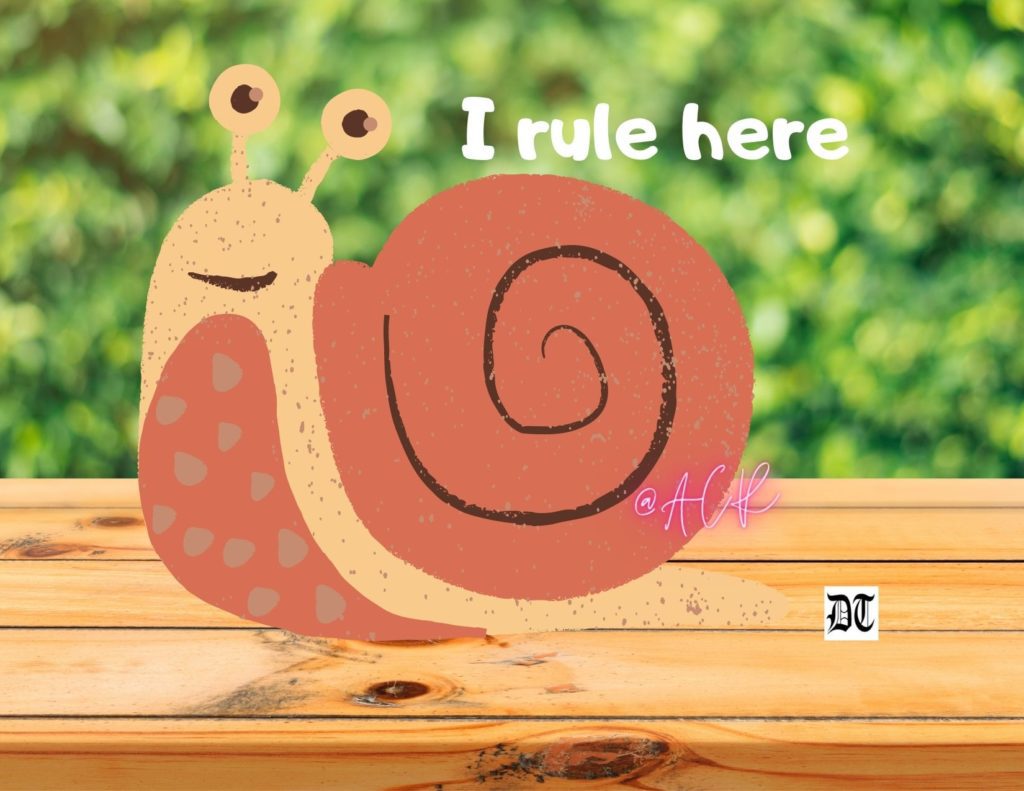
The funniest experience we have had was of a pet egg. Aditya was twelve. Aditya’s best friend, Antonio, wanted to grow a chicken from an egg. Aditya was doing this in class, but Antonio, a newly arrived Italian, being in a group that catered to beginners in English, did not get this exposure in his science lesson. In Suzhou, your best friend could be someone from a totally different linguistic and cultural background. In some places, such as Singapore, there are international schools that cater to needs of individual communities: American, European, German, French, Indian, Australian, and British. In Suzhou in the first decade of the new millennium, there were only two major international schools that saw you through from start to finish. Foreigners like us sent our children to one of the two schools. As a result, we discovered that under the different garbs of cultures and languages, we had the same concerns and the same needs.
To make up for the deficit in his scientific education, Antonio took an egg from his mother’s refrigerator, put it in a paper cup, drew a beautiful face on it, wrapped it warmly with a paper serviette, and put it near the room heater to incubate. He even took it to school in the pet lamb tradition of Mary. He was scared that someone, perhaps even his younger brother, would harm it if it were parted from him.
To make up for the deficit in his scientific education, Antonio took an egg from his mother’s refrigerator, put it in a paper cup, drew a beautiful face on it, wrapped it warmly with a paper serviette, and put it near the room heater to incubate. He even took it to school in the pet lamb tradition of Mary. He was scared that someone, perhaps even his younger brother, would harm it if it were parted from him. So obviously, when he came to visit his best friend, Aditya, he brought it to our house. That day he didn’t greet me as usual but rushed up the stairs with something concealed in his hands. Then the boys rushed out to cycle. I went up to Aditya’s room and found the pet egg sitting under the blue neon light on Aditya’s desk. The lamp was on in bright sunlight. So I promptly put off the lamp. After some time, the boys came in. My husband went up to check on them. He found the lamp on and turned it off. Eventually, we were informed by the boys that they were keeping the egg under the blue light to keep it warm. Then Antonio’s father, who was having a cup of coffee with us while he was waiting to pick up his son, commented that we all could party eating up the chicken when it hatched. I have never ever seen a boy look sadder than Antonio at this remark!
The pet egg saga finally ended when Antonio’s six-year-old brother broke the egg at school. In the epitaph, Aditya told me the chicken probably had started developing, as most of the stuff inside the egg was yellow!
Luckily for me, currently most of Surya’s friends had fish or nothing, or I might have had to keep an elephant in my garage!
References:
1 https://www.britannica.com/topic/one-child-policy
3 https://www.skyscanner.com/tips-and-inspiration/suzhou-china-venice-of-the-east
Visuals from Different Truths


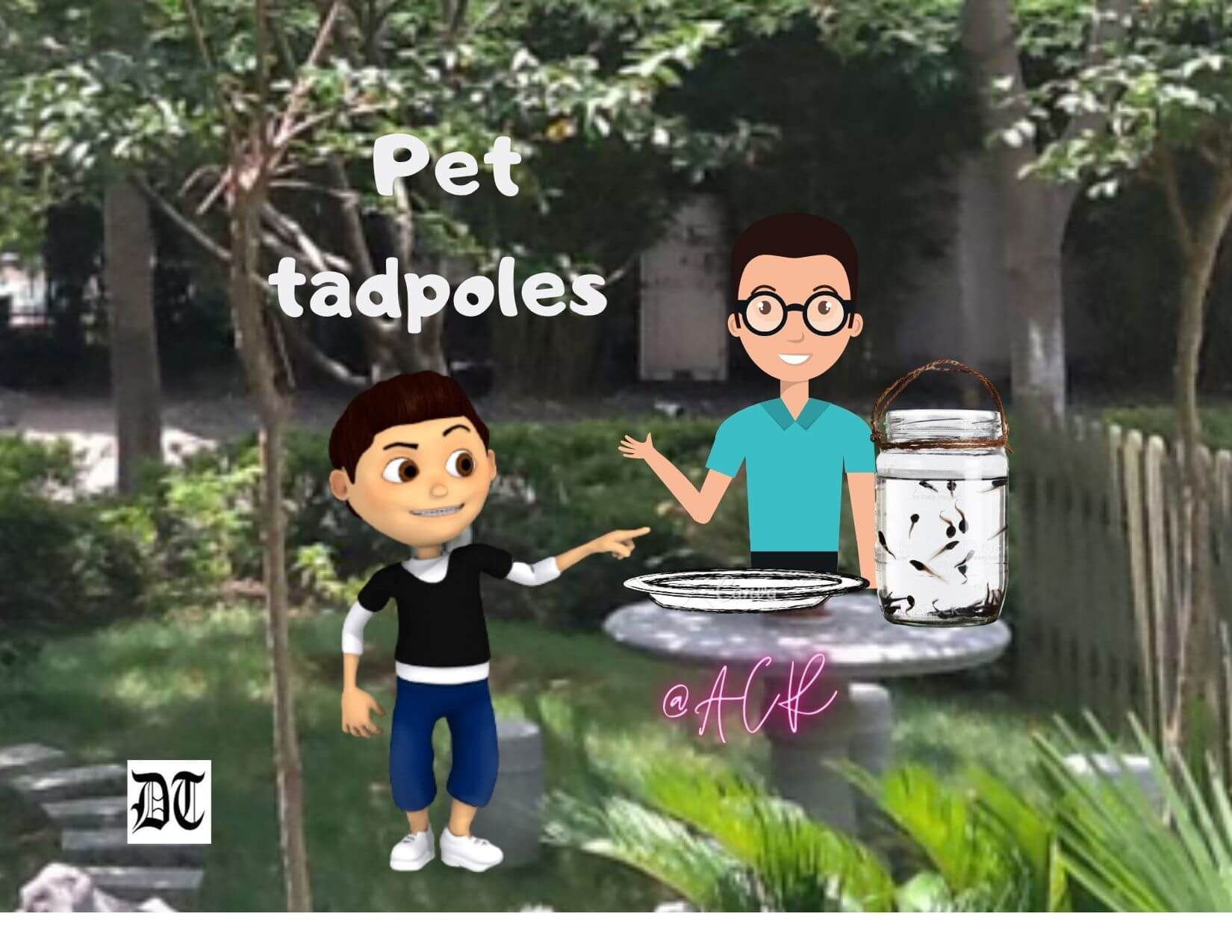

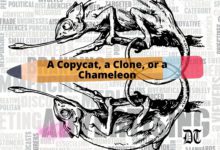

 By
By
 By
By

 By
By